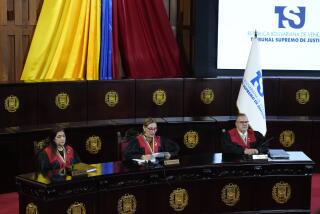Turkey’s ruling party escapes being banned
- Share via
ISTANBUL, TURKEY — Turkey’s highest court Wednesday decided against outlawing the ruling party, which had been accused of attempting to advance an Islamist agenda in officially secular Turkey.
The narrow verdict, which came after three days of closed-door hearings, averted what could have been a drawn-out political crisis but did little to address fundamental tensions between religiously observant Turks and their more secular-minded compatriots.
In its ruling, the Constitutional Court penalized the Justice and Development Party, known by its Turkish initials, AKP, with financial sanctions that represent a loss of about half the party’s subsidy from the government treasury. But the penalty was not expected to significantly curtail the AKP’s ability to function because the shortfall can be made up at least in part by private donations.
The verdict was greeted with evident relief by the AKP. Cabinet minister Faruk Celik called it a victory for Turkish democracy. The party had steadfastly denied the charges and said they were politically motivated.
Outlawing the AKP, which solidly won last summer’s parliamentary elections, would have been a drastic step for the court to take. A ban on the party or any of its senior leaders probably would have forced early elections and seriously damaged Turkey’s prospects for moving ahead with efforts to join the European Union.
Financial markets were expected to be buoyed by the verdict. The stock exchange had closed for the day when the ruling was issued, but market jitters had already calmed on speculation over the last day or two that the court would decide against a ban.
The AKP’s constituency is mainly made up of devout Muslims whose growing economic prosperity has emboldened them to seek what they consider greater religious freedoms. The secular camp, though, sees public displays of piety, even in an overwhelmingly Muslim country, as a violation of Turkey’s secular constitution.
The case against the AKP was brought by prosecutors after the government tried this year to lift a ban on the wearing of Muslim head scarves in public universities. That prohibition has its roots in the decision of modern Turkey’s highly respected founding father, Kemal Ataturk, to ban religious dress in public institutions.
The fact that the Constitutional Court agreed to hear the case at all was a shock to the AKP and many of its supporters. If the party had been banned, its leaders probably would have dissolved the government, called elections and reconstituted the party under a different name.
The case also put the AKP on notice that the court would be watching it closely for the remainder of the party’s five-year term. Six of the 11 judges voted in favor of the ban -- just one short of the required number.
The Constitutional Court’s chairman, Hasim Kilic, said at a news conference in the capital, Ankara, that the cut in the AKP’s state subsidy came at the urging of judges who considered the party a “hub of anti-secular activities” and wanted the gesture to serve as a warning. The court traditionally has seen itself as a chief guardian of the secular constitution.
Some analysts speculated that the court feared that a remade AKP would have returned with an even stronger public mandate. Others said prosecutors simply failed to make a sufficient case that the party’s policies posed enough of a threat that it should be outlawed.
Just before the case went to court, Prime Minister Recep Tayyip Erdogan appeared to be seeking reconciliation with the secular camp, saying in a newspaper interview that “mistakes” had been made and calling for unity.
--
Special correspondent Comert reported from Istanbul and Times staff writer King from Peshawar, Pakistan.
More to Read
Sign up for Essential California
The most important California stories and recommendations in your inbox every morning.
You may occasionally receive promotional content from the Los Angeles Times.










